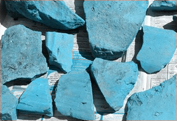|
Carrying on with our recent Egypt theme, as I mentioned at last month’s meeting,
work is being carried out by Oxford University on the tombs of Kagemni, Ptah-hotep and
Nefer-heren-ptah at Saqqara. This privately funded expedition is now looking for
organisations and individuals to help offset the cost of their work. With this in
mind I have sent on behalf of the society a cheque for £10. ‘Friends’ will
receive information on all activities, and an annual report on progress of the work on the
tombs. The expedition was set up 1989 with a team of academics and experienced field
workers all vetted by the Supreme Council for Antiquities in Egypt.
Kagemni
He was Chief Justice and Vizier and Overseer of all the ‘King’s
Works’ of King Teti. He was the first king of the Sixth Dynasty in the Old
Kingdom, reigning a few hundred years after the building of the great pyramids at
Giza. By the time of Teti, royal burials had moved 10 km south from Giza, to Saqqara
where the stepped pyramid of Zoser had been built 400 years earlier.
At the peak of his career Kagemni was granted permission to build his tomb near the
entrance to the pyramid of King Teti. His was the first and arguably the best
decorated tomb in the Teti Pyramid Cemetery. Inside his tomb is a multi-roomed
chapel consisting of five two-tiered magazines (for food storage) and eight cult rooms
which were open to the public in antiquity.
The walls in seven of the cult rooms bear a rich panorama of reliefs showing Kagemni
and his family, as well as daily work on his estate, various funeral rituals, and
literally hundreds of figures carrying a multitude of offerings. Door pivot
mechanisms, stone patching, plaster repairs and bolt holes are just some of the well
preserved examples of the masons’ skills.
Ptah-hotep II
He was chief justice and Vizier of King Unas, last King of the Fifth Dynasty. His
Chapel is one of the best known antiquities of Egypt, due to the beauty and variety of its
carved and painted reliefs and to its wonderful state of preservation.
Nefer-heren-ptah
He was Overseer of Hairdressers of the Great House, and probably lived during the
reigns of Kings Neuserre and Menkauhor in the mid fifth Dynasty. The suggestion is
that he died prematurely as his chapel is unfinished. However because of this it is
Saqqara’s finest example of the various stages in relief sculpture, ranging from
delicate preliminary sketches, to blocked out reliefs and finally to completed reliefs
including muscle modelling and intricately cut wings.
These tombs and others at Saqqara have deteriorated rapidly in recent years due to a
number of unwelcome environmental factors. This is why the expedition introduced a
programme of tomb repair in 1994, and is now pioneering a new approach to the
documentation and archiving of these remarkable ancient monuments.
Next Meeting
The next meeting of the Society will be this Wednesday 1st April at the history shop at
7.30 p.m. as usual. As we have no official speaker this month, you’ve guessed
it, I will be showing slides from our trip to Luxor. I am only going to show the
best selection from the vast number that both myself and Mike Booth took, so it
shouldn’t be too bad.
Hope to see you there - B.A.
|



